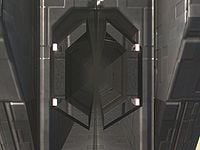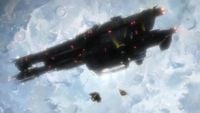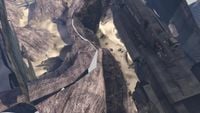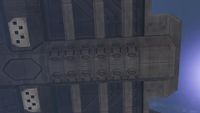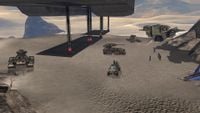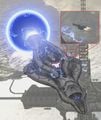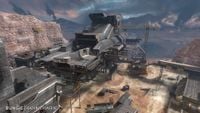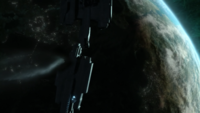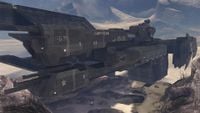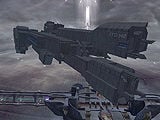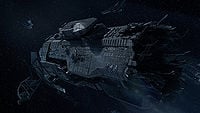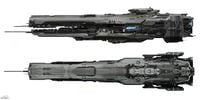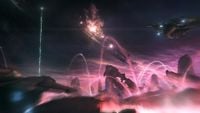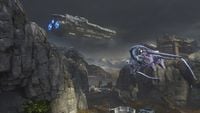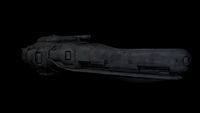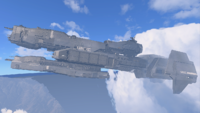UNSC frigate: Difference between revisions
From Halopedia, the Halo wiki
| Line 376: | Line 376: | ||
File:H4-StridentHeavyFrigate-ScanRender.png|A [[Strident-class heavy frigate]], designed in the postwar era with greater defensive and offensive capabilities than previous types. | File:H4-StridentHeavyFrigate-ScanRender.png|A [[Strident-class heavy frigate]], designed in the postwar era with greater defensive and offensive capabilities than previous types. | ||
File:H5G Anlace-class Frigate.jpg|An [[Anlace-class frigate]], a postwar design unique in its lack of a spinal-mounted MAC cannon. | File:H5G Anlace-class Frigate.jpg|An [[Anlace-class frigate]], a postwar design unique in its lack of a spinal-mounted MAC cannon. | ||
File:HINF_Highpower_UNSCPanama.png|An [[Unidentified UNSC frigate class|unidentified class of frigate]], distinctive for its centralized engine system more akin to a Strident-class vessel, engaged above [[Installation 07]]. | |||
</gallery> | </gallery> | ||
{{Linkbox|gallery=yes|gallerypage=Images of UNSC frigates}} | {{Linkbox|gallery=yes|gallerypage=Images of UNSC frigates}} | ||
Revision as of 13:30, November 17, 2021
| This article does not meet the wiki's general standards and/or standards on layouts. You can help by cleaning this article. |
| UNSC frigate | |
|---|---|
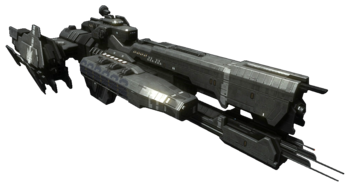  A Paris-class heavy frigate (top) and a Charon-class light frigate. | |
| Production information | |
|
Class: |
|
|
Role: |
|
| Technical specifications | |
|
Length: |
Variable: |
|
Width: |
Variable: |
|
Height: |
Variable: |
|
Engine(s): |
|
|
Slipspace drive: |
|
|
Hull: |
60 centimetres (2 ft 0 in) titanium-A battle plate |
|
Armament: |
|
|
Complement: |
|
| Chronological and affiliation | |
|
Affiliation: |
|
Frigate (hull classification symbol FFG) is a warship classification in the UNSC Navy. Although they do not possess the same degree of armor, armament, and firepower as destroyers, frigates are lighter and more maneuverable. They are also cheaper to produce, allowing greater numbers to be fielded against the Covenant.
Background
During the Human-Covenant War, UNSC frigates were barely considered a match for even the smallest of Covenant warships. Their armor was susceptible to enemy point-defense pulse lasers and plasma torpedoes, and it is outfitted with substandard weaponry. Only en masse did the UNSC frigate give any UNSC fleet element an advantage against even inferior numbers of Covenant capital ships. By 2552, UNSC frigates designs became more technologically advanced as seen with both the Strident-class heavy frigate and the Anlace-class frigate.
The frigate's speed and maneuvering are its advantage, however, allowing UNSC frigates to provide fire support to other UNSC fighter craft such as Sabres or Longswords and engage both multiple enemy single ship fighters, such as Banshee interceptors or Seraphs, and light enemy warships simultaneously; its speed allows it to put down fire on an enemy ship while being able to avoid a large amount of fire from largely superior Covenant weaponry.[10] In addition to this, its small size and role as a troop carrier vessel make it ideal for supporting ground operations in planetside theaters of action, capable of laying down suppressive fire against Covenant ground forces while deploying its complement of aircraft and marines to bolster UNSC forces on the surface.
Layout
While details between the various classes of UNSC frigate vary, all share the same overall design and layout.
Bridge
The bridge of the frigate is located in the uppermost part of the ship, in the section at the stern-most tip of the MAC gun shaft. The commanding officer's chair is located behind the two primary consoles within the bridge. There also are numerous other consoles located at the sides of the room. There are four bridge stations: Navigation, Operations, Weapons, and Communications. There are airlocks on both sides on the bridge.[11] Modern frigate classes are also equipped with universal hardpoints on their dorsal and ventral hulls, allowing them to dock with other UNSC vessels.[12] On top of the bridge is a maser dish for short-range communication.
Midsection
The forward midsection of the ship has numerous single ship hangar bays for Pelicans or fighter craft like Longswords on both sides. A UNSC frigate also possess twelve SOEIV bays, located in the rear of the ship, which facilitate the deployment of Orbital Drop Shock Troopers. Also, spread throughout the frigate's structure are a number of its many escape pod bays.
Main hangar
Some frigate classes, namely the Charon-class, also have a large loading elevator in their rear section which is capable of extending out of the ship's ventral side to deploy vehicles or cargo directly to the ground.[13][14] The UNSC Forward Unto Dawn featured a large rear section which had the capacity of holding several Pelicans in addition to numerous ground vehicles. These hangar floor elevators have been seen operating in two different modes; the single-sided hinges on the elevator are able to swing down 90° in order to allow aircraft like Pelicans to drop vertically out of the hangar for quick deployment.[14] So far the frigate is the only UNSC warship that has been seen landing and deploying vehicles directly to the surface of a planet (or Installation 00 in the Dawn's case).
Classes
The Navy uses multiple frigate classes. Though they vary in size, armament, and purpose, they all follow some of the same design principles.
- The Charon-class light frigate can carry a large complement of troops and vehicles. It is not as heavily armed or armored as other escort vessels of similar design. This belies a role as fleet support and troop carrier, although it is still capable of ship-to-ship combat.
- The Paris-class heavy frigate boasts additional titanium-A armor plating and a larger number of point-defense guns than standard frigates, giving it greater capabilities as a fleet support vessel.
- The Stalwart-class light frigate is best suited for planetary defense, fleet escort duties, and troop deployment. It has a smaller complement of vehicles than the Charon class, and less armament than the Paris class, effectively balancing it between troop transportation and fleet support.
- The Strident-class heavy frigate is best suited as an escort ship and swift-attack vessel used in large-scale naval space battles.
- The Anlace-class frigate lacks a MAC spinal mount but has a light MAC on top. Primarily uses directed-energy weapons.
- The Unidentified UNSC frigate class closely resembles its aforementioned predecessors but lacks the lower bays characteristic of most frigates, and features a more centralized engine system. It seems more suited for direct assaults like the Paris-class as opposed to troop deployment.
Specifications
Propulsion
Like other human ships, the UNSC frigate is powered by thermonuclear fusion reactors which use deuterium (a stable hydrogen isotope) as fuel. The engines almost certainly use the energy obtained from this process to heat some form of reaction propellant which is expelled out of rear-facing exhausts to generate thrust. There are four exhausts visible on frigates; two large and two small. In addition, the frigate has two sets of forward maneuvering thrusters near the front.[11]
UNSC frigates are capable of hovering in an atmosphere and even landing. This is likely accomplished through the use of anti-gravity generators, although the technology involved has never been elaborated upon. Frigates are able to perform a Class-L flash-dock, a landing procedure used when time is of the essence which requires precise maneuvering control.[15]
For interstellar voyages, the frigate carries a Shaw-Fujikawa Translight Engine.
Armament
A typical UNSC frigate carries the following armament:
- 1 Magnetic Accelerator Cannon which is able to fire one round per charge. The MAC runs between one- and two-thirds of a Frigate's total length. MACs are typically spinally mounted to a frigate, though they are not on at least one post-war frigate class.[16][17]
- 3 Shiva-class nuclear missiles serve as heavy ordnance.
- 40 Archer missile pods which carry around thirty missiles per pod, adding up to a total of 1200 missiles.
- 4-12 50mm point defense guns function as the last line of defense against single ships and incoming missiles, with the ability to later retract into the vessel. They are used for aerial bombardment on occasion. The model and amount of guns possessed by each ship varies by class.
Crew
No precise figures are available regarding the crew of a frigate, although numbers have been speculated. Like larger ships, a detachment of Marines and possibly ODSTs would be present onboard. The crew number includes deck crews as well as the command crew, Marines, ODSTs, dropship pilots, and technical personnel. The number of personnel a single frigate is capable of housing numbers at least within the thousands.[18] Since many frigates have been seen in ground support roles, it is likely that the complement of Marine and ODST personnel on board is higher in percentage than other ships that are more dedicated to space combat.
In 2552 Sergeant Major Avery Johnson was supposedly able to singlehandedly control the frigate UNSC Forward Unto Dawn to aid Spartan John-117 and Arbiter Thel 'Vadam on the newly rebuilt Halo, though an auto-pilot function was available with the use of the ship's onboard navigational computer. An AI can monitor and regulate all critical functions without human intervention.
Superstructure
The armor of a frigate is relatively poor compared with that of its larger cousins and counterparts such as the UNSC destroyer, with only 60 cm of titanium-A battle plate. However, due to its relatively light weight, the frigate's strength lies instead in maneuverability and speed. The frigate's relatively wide design is supported by structural support ribs, allowing it to perform orbital incursions. As of 2558, certain frigates (namely, the UNSC Infinity's ten Strident-class sub-vessels) possess energy shielding technology.[19]
Known frigates
| List of known frigates | |||||
|---|---|---|---|---|---|
| Name | Hull classification symbol | Earliest sighting | Engagements | Status | Notable information |
| UNSC Aegis Fate | FFG-307 | August 2552 | Fall of Reach |
Unknown | |
| UNSC Agincourt | FFG-??? | 2552 | Onyx Conflict | Destroyed - October 31, 2552 | |
| UNSC Allegiance | FFG-??? | July 2552 | Battle of Sigma Octanus IV | Unknown | |
| UNSC Anlace | FFG-??? | Lead ship of the Anlace-class frigate. | |||
| CMA Arabia | CMA-??? | 2525 | Investigation of Harvest | Destroyed - 2525 | |
| UNSC Cascadia | FFG-??? | 2556 | Rescue mission on Cleyell | Active (presumed) | |
| UNSC Charon | FFG-??? | Lead ship of the Charon-class light frigate. | |||
| UNSC Chioglossa | FFG-127 | October 20, 2552 | Battle of Earth | Destroyed | |
| UNSC Commonwealth | FFG-??? | November 2525 | Battle of Chi Ceti IV | Decommissioned some time between 2525 - 2552 | Dismantled at the Asźod ship breaking yards on Reach |
| UNSC Fair Weather | FFG-??? | July 2552 | Battle of Sigma Octanus IV | Destroyed | |
| UNSC Forward Unto Dawn | FFG-201 | November 17, 2552 | Battle of Earth
Operation: BLIND FAITH |
Destroyed Lost in space, crashed on Requiem |
Aft section adrift in unknown region of space with Spartan-117 and Cortana aboard. |
| UNSC Gettysburg | FFG-??? | July 2552 | Battle of Sigma Octanus IV Fall of Reach |
Active (presumed) | Once coupled with the Covenant carrier Ascendant Justice The only UNSC ship equipped with a Covenant Borer |
| UNSC Grafton | FFG-318 | August 12, 2552 | Fall of Reach | Destroyed - August 12, 2552 | Heavy frigate |
| UNSC In Amber Clad | FFG-142 | April 2550 | Battle of Earth |
Damaged - November 3, 2552 Destroyed in late 2552 |
Commandeered by the Flood |
| UNSC Journeyman | FFG-??? | September 2517 | Unknown | Was patrolling the Eridanus system in 2517 | |
| UNSC Meriwether Lewis | FFG-??? | Before 2552 | |||
| UNSC Midsummer Night | FFG-209 | 2535 | Battle of the Rubble | Unknown | Light frigate Temporarily captured by Insurrectionists |
| UNSC Panama | FFG-??? | 2560 | Installation 07 conflict | Unknown | |
| UNSC Paris | FFG-??? | October 2552 | Battle of Earth | Unknown | |
| UNSC Promise of Dawn | FFG-??? | 2552 | Destroyed - 2553 | Declared MIA after Fall of Reach, distress signal attributed to the ship was received from Sephune III in 2553. | |
| UNSC Purpose | FFG-??? | February 13, 2526 | Battle of Bliss | Destroyed - 2526 | |
| UNSC Ready or Not | FFG-??? | 2535 | |||
| UNSC Redoubtable | FFG-??? | October 20, 2552 | Battle of Earth | Unknown | Detected Forerunner signal from Delta Halo |
| UNSC Saratoga | FFG-??? | August 12, 2552 | Fall of Reach
|
Unknown | Heavy frigate |
| UNSC Savannah | FFG-371 | August 13, 2552 | Fall of Reach
|
Destroyed - 2552 | Heavy frigate |
| UNSC Stalwart Dawn | FFG-101 | August 23, 2552 | Fall of Reach | Unknown | Light Frigate |
| UNSC Swift Justice | Unknown | ||||
| UNSC Tannenberg | FFG-??? | January 2531 | |||
| UNSC Tripping Light | FFG-??? | 2547 | Decommissioned and dismantled - September 4, 2547 | ||
| CMA Vostok | CMA-??? | February 2525 | Investigation of Harvest | Destroyed | |
| UNSC Welcome to the Snipehunt | FFG-??? | July 2558 | Active | ||
Gallery
- InAmberClad-scale.gif
A scale comparison between the UNSC frigate and miscellaneous objects.
A scale comparison between the UNSC Grafton and the UNSC Forward Unto Dawn, and the UNSC Grafton and the Long Night of Solace.
A UNSC frigate picking up survivors from Algolis.
- ArabiaVostok.png
CMA Arabia and CMA Vostok being destroyed in the First Battle of Harvest.
A comparison between a Longsword and a frigate.
A frigate firing a round from its MAC.
Frigate UNSC In Amber Clad compared to the Prophet of Regret's assault carrier.
A UNSC frigate, the Commonwealth, being taken apart, partially showing the ship's internal structure.
The Forward Unto Dawn, a Charon-class light frigate, hovering over Installation 00.
The frigate In Amber Clad, a Stalwart-class light frigate, inside High Charity.
The aft section of the frigate Forward Unto Dawn as depicted in Halo 4.
Two frigates escorting the UNSC Infinity in Halo 4 Spartan Ops episode 2.
The Infinity's sub-vessels clearing the corridor into Requiem.
A frigate being shot down over Draetheus V.
A frigate over Oban.
A Strident-class heavy frigate, designed in the postwar era with greater defensive and offensive capabilities than previous types.
An Anlace-class frigate, a postwar design unique in its lack of a spinal-mounted MAC cannon.
An unidentified class of frigate, distinctive for its centralized engine system more akin to a Strident-class vessel, engaged above Installation 07.

|
Browse more images in this article's gallery page. |
List of appearances
Sources
- ^ a b c Halo: Reach 3D game data
- ^ a b c Halo 2 3D game data
- ^ a b c Halo 3 3D game data
- ^ a b c Halo 4: The Essential Visual Guide, page 192
- ^ Halo: Official Spartan Field Manual, page 14
- ^ Halo 2, campaign level Delta Halo (Bridge officer: "Both engine cores have spun to zero.")
- ^ Halo: First Strike, page 275
- ^ Halo: The Fall of Reach, page 111
- ^ Halo Waypoint - Canon Fodder: Calm in the Storm
- ^ Halo: Reach, campaign level Long Night of Solace
- ^ a b This piece of Halo 3 concept art specifies several parts of the frigate's design. Some elements, like the Harpoon nuke, are not canon.
- ^ Halo: First Strike, pages 208-209
- ^ Halo 2
- ^ a b Halo 3, campaign level The Ark
- ^ Data Drop #6
- ^ Halo 5: Guardians
- ^ Spartan Games: Halo Waypoint Update with Spartan - NEW SHIPS!
- ^ Halo: First Strike, page 220
- ^ Spartan Ops, S1E1 - Departure
| ||||||||||||||||||||||||||||||||||||||||||||||||||||||||
